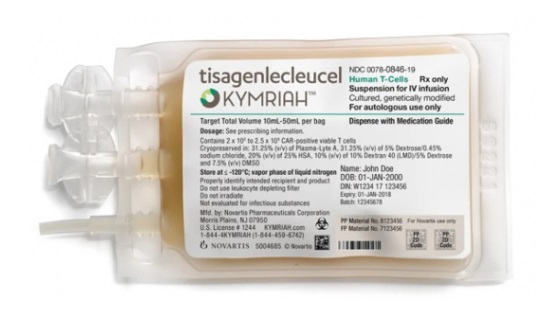Novartis Korea said that the Ministry of Food and Drug Safety has approved its CAR-T treatment Kymriah (ingredient: tisagenlecleucel) to fight rare blood cancers, ushering in a new approach to cancer treatment.

Kymriah is the first customized cell treatment that uses a patient's T-cells to fight cancer. Hospitals can use the therapy in treating patients with recurrent and refractory diffuse large B cell lymphoma (DLBCL) and pediatric patients under 25 with acute lymphoblastic leukemia (pALL).
The ministry took into account two phase 2 clinical trials – JULIET and ELIANA – conducted jointly with the University of Pennsylvania.
According to Novartis Korea, JULIET clinical trials showed an overall response rate (ORR) of 53 percent after three months of Kymriah treatment on adult relapsed and refractory DLBCL patients. Of the patients that showed a response toward the drug, 39.1 percent of them reached complete remission.
The ELIANA study on children with relapsed and refractory ALL showed 82 percent of patients achieved CR or complete remission with incomplete blood count recovery within three months of the administration. The company also confirmed that 98 percent of the patients who reached remission were negative for minimal residual disease and had a 73 percent event-free survival rate after six months.
Both clinical trials demonstrated clinical efficacy, but did not reach the median duration of response and median overall survival during the trials. Such results proved that patients who responded well to Kymriah continued to show efficacy even after receiving treatment, the company said.
Novartis creates Kymriah by collecting the patient's T-cells and genetically modifying them at a manufacturing center to include a new gene with a chimeric antigen receptor (CAR). This protein directs T-cells to kill leukemia cells with a specific antigen (CD19).
The treatment has drawn much attention with its excellent therapeutic effects on blood cancer, which has been difficult to treat with the existing chemotherapy.
Kymriah has also become the first treatment to receive approval based on the Advanced Regenerative Medicine Act implemented in August last year to strengthen and support biopharmaceuticals' quality and safety management.
"Kymriah is an innovative individually customized treatment with a new mechanism that has never been seen in the history of anticancer treatment," said Professor Yoon Sung-soo of the Department of Hemato-oncology at Seoul National University Hospital. “Patients with relapsed and refractory DLBCL who have already failed other treatment options and have a life expectancy of only three to six months can reach complete remission after receiving the treatment only once and increase their survival rate.”
The approval of Kymriah is of great significance as it improves survival rate and helps patients and other family members return to their daily lives by reducing patient visits to the hospital, Yoon added.

